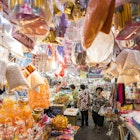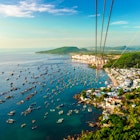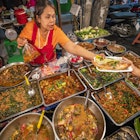
Nov 5, 2024 • 9 min read

Make the most of your time in bustling Bangkok with our 9 insider tips © Witthaya Prasongsin / Getty Images
I moved to Bangkok in 1999, a time when most visitors to Thailand reluctantly did a night in this megacity before beelining to an island or the north. Synonymous with traffic jams, pollution and urban sprawl, the Thai capital was largely seen as an unwanted but obligatory stopover.
Decades later, things have changed and Bangkok is now the destination of choice for many visitors – with good reason. Easier to get around and cleaner than ever, with a vibrant eating and drinking scene that caters to just about every budget and an enviable spread of intriguing sights and fantastic-value shopping, the city has more to offer than ever before.
Yet like any big city, Bangkok has its quirks and surprises. Here's what you need to know before you go.
Find out what you should know in advance about Thailand, including important cultural, religious and legal issues, etiquette and health.
Bangkok used to be synonymous with traffic jams and air pollution. The jams still happen, but the good news is that the city’s public transportation system has grown immensely. The various above and underground rail networks currently unite 10 different lines – with more in the works – and 192 stations, including trains linking both of Bangkok’s international airports and the city center.
On top of this, taxis remain ubiquitous and cheap – though subject to the issues that make the city’s traffic so infamous – while quirky public transportation systems such as the city’s river and canal taxis provide a slow but steady (and scenic) way to get around.
Thailand has a low crime rate and is generally considered a safe country. Bangkok suffers from the same type of violent crimes as any big city, but anecdotally, is considered a safe place. Apart from occasional bag snatching and theft, the most dangerous thing in the city is its traffic (Thailand’s roads are some of the deadliest of any country). Solo women travelers and locals I’ve spoken to also report feeling safe in the city.
A particular Bangkok annoyance is scams directed at tourists. These typically involve taxi drivers who refuse to use their meters, or tuk-tuk drivers and/or well-dressed, English-speaking men who appear out of nowhere offering free tours that inevitably lead to dodgy gem shops or tailors. The good news is that most of these situations are easy to spot and relatively low-pressure; if something seems off, simply walk away.
It’s also worth noting that Bangkok’s police don’t have a great reputation. Steer clear of them unless you really need help.

Western chefs and food media have been raving about Bangkok’s street food for more than a decade. And it’s a fun, often delicious way to eat. But if you relegated yourself to street food alone, you’d miss the entire scope of Bangkok’s cuisine.
Supplement those streetside noodles with meals at the charming, decades-old restaurants in the old town – these are the places that get the most praise in the Thai-language media. In Bangkok’s newer districts, such as along Thanon Sukhumvit, consider a Japanese meal – the city is home to one of the largest populations of Japanese people outside of Japan.
If your budget allows, consider a splurge restaurant. While the rest of the world was obsessing over its street food, Bangkok's dining scene went in the opposite direction and today is home to several modern, cutting-edge upscale restaurants.
Bangkok is one of the hottest capital cities in the world, with an average mean temperature of 29°C (84°F). This heat is compounded by intense humidity and the urban environment, which reflects and retains heat, meaning the city often feels much, much (much) hotter. April is Bangkok's hottest month, with an average daily max temperature of 35°C (96°F) and during the “winter” in December and January, temperatures rarely dip below 20°C (68°F).
All of this means you shouldn't try to cover too much ground on foot – an already difficult task given the city’s lack of pedestrian infrastructure. If you do walk, learn the technique of regularly ducking into air-conditioned malls, hotel lobbies and 7-Elevens to cool off.
Likewise, pack light clothing, but remember – Thais are conservative when it concerns showing skin in public and Bangkok is not the beach.
LGBTIQ+ people are made to feel welcome in Bangkok, which is generally considered Asia’s most queer-friendly city. The epicenter of the gay scene is Thanon Silom, especially in and around Soi 4, which is ostensibly Asia’s biggest queer nightlife area.
Thankfully, it looks like this queer-friendly vibe will extend to legislation. In 2023, the Thai parliament passed draft bills on same-sex marriage, which are expected to become laws, making Thailand the first country in Southeast Asia to allow same-sex marriage.
Keep in mind that public displays of affection between people of any gender are frowned upon in Thailand.

If you want to be based in the world’s most famous backpacker strip – and all that that entails – book a bed or room on Thanon Khao San, generally known as Khao San Road. It’s lively and fun, and provides easy access to the city’s old town.
But having moved slightly upscale in recent decades, Khao San Road no longer represents the best value area to stay in Bangkok. And with loud bars and a boozy vibe, it’s definitely not the most peaceful place to stay.
If you want to have access to the backpacker amenities but don’t want the noise and hassle, consider staying in the streets nearby, such as Thanon Rambutri or Thanon Phra Athit.
During the annual monsoon, from approximately May to October, Bangkok’s streets occasionally turn into rivers. During this time of year, don’t be surprised if you have to camp out on an elevated street corner or in a 7-Eleven until the waters recede.
While shopping malls are a dying breed in much of the west, they’re thriving in Bangkok. The city is home to some of the most over-the-top shopping centers in the world, which in contemporary Bangkok, have a dual function as (conveniently air-conditioned) social centers. Thais gather at the city’s more than 500 shopping centers to chat, eat, take selfies and occasionally make purchases, and so should you.

Every year around April, Bangkok grinds to a halt during Thai New Year, known as Songkran or the water festival. The tradition has its origins in the cleansing role of water, but these days it essentially means that Bangkok becomes ground zero to a multi-day, raucous water battle.
Whether you're into it or not, you’ll be splashed with water and/or smeared with baby powder. Don’t even attempt stepping outside your door with your Sunday best on and don’t expect your favorite restaurant, or that museum or monument to be open (shopping centers, inevitably, will be operating). Discover more about Bangkok's festivals and seasonal attractions in our guide to the best time to visit the city.
In June 2022, marijuana and hemp were removed from the Category 5 narcotics list in Thailand. However, there are still many restrictions and smoking marijuana in public is not legal and is not recommended.
“One Night in Bangkok” is indeed a reality. But if you steer clear of the main red-light zones at night – namely Thanon Patpong, Soi Nana and Soi Cowboy – it's likely you won’t even witness this side of the city.

Festivals & Events
10 of the world's best places to celebrate New Year’s EveNov 13, 2024 • 7 min read

Nov 5, 2024 • 9 min read







